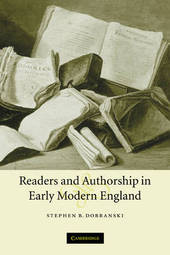
|
Readers and Authorship in Early Modern England
Paperback / softback
Main Details
| Title |
Readers and Authorship in Early Modern England
|
| Authors and Contributors |
By (author) Stephen B. Dobranski
|
| Physical Properties |
| Format:Paperback / softback | | Pages:244 | | Dimensions(mm): Height 229,Width 152 |
|
| Category/Genre | Literary studies - c 1500 to c 1800 |
|---|
| ISBN/Barcode |
9780521120180
|
| Classifications | Dewey:820.9003 |
|---|
| Audience | | Postgraduate, Research & Scholarly | |
|---|
| Illustrations |
Worked examples or Exercises
|
|
Publishing Details |
| Publisher |
Cambridge University Press
|
| Imprint |
Cambridge University Press
|
| Publication Date |
24 September 2009 |
| Publication Country |
United Kingdom
|
Description
While authors in early modern England were gaining new authority - legally, economically and symbolically - Renaissance readers also were expected to participate in and make use of an author's writings. In this book, Stephen B. Dobranski examines how the seventeenth-century phenomenon of printing apparently unfinished works ushered in a new emphasis on authors' responsibility for written texts while it simultaneously reinforced Renaissance practices of active reading. Bringing together textual studies, literary criticism and book trade history, Dobranski provides fresh insight into Renaissance constructions of authorship and offers discerning interpretations of publications by Sir Philip Sidney, Ben Jonson, John Donne, Robert Herrick and John Milton. The omissions in all these writers' works provide a unique window into English literary history: through these blank spaces we glimpse the tension between implication and inference, between writers' intentions and readers' responses and between an individual author and a collaborative community.
Author Biography
Stephen Dobranski is author of Milton, Authorship and the Book Trade, and co-editor of Milton and Heresy.
Reviews"Dobranski does spotlight the activity of a number of stationers, clearly explaining their most likely courses of action and valuably extending his own readers' view of literary exchange beyond the simplistic dichotomy of authors and readers." - Joshua Eckhardt, Virginia Commonwealth University
|